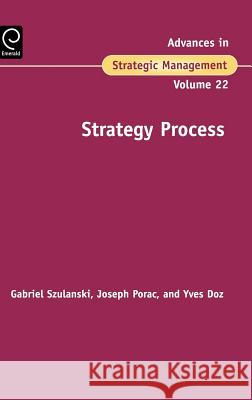Strategy Process » książka
Strategy Process
ISBN-13: 9780762312009 / Angielski / Twarda / 2005 / 552 str.
Enduring scholarly interest in the process of strategy making stems from an abiding assumption that some ways of strategizing are more efficacious than others, and thus lead to higher firm performance in the long run; higher than luck alone would bring. Expressions of interest in and endorsements of the strategy process are abundant in the academic literature. For senior managers and leaders, the question of how to make effective strategies stands usually at the top of their agenda. Not surprisingly then, the quest to uncover stable principles of good strategy making has attracted much support and interest over the years.
Researchers who responded to the strategy process challenge have known many moments of exhilaration and disillusion. Scholarly insights took long to accumulate, perhaps too long to serve as the sole basis for helping the eager practitioner in search of simpler but applicable advice. As a result, a significant and often highly visible part of the field is characterized by a controversial normative orientation.
But beneath this dramatic and unstable facade lies a gradual, patient, and seemingly more stable, hard-at-work, academic enterprise. Scholarly strategy process research apparently goes on, perhaps more than ever, suggesting that there is something fundamental and deeply interesting and profound about how strategies are made, where they originate in organizations, and how the process of strategy making impacts the performance of organizations.
This volume is the culmination of our three year effort to explore and uncover this relatively hidden or at least less visible side of thestrategy process field. Taken together, the sixteen chapters represent current scholarly strategy process research.











